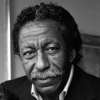Gordon Parks

Gordon Parks
Gordon Parkswas a noted American photographer, musician, writer and film director, who became prominent in U.S. documentary photojournalism in the 1940s through 1970s—particularly in issues of civil rights, poverty and African-Americans—and in glamour photography. As the first famous pioneer among black filmmakers, he was the first African-American to produce and direct major motion pictures—developing films relating the experience of slaves and struggling black Americans, and creating the "blaxploitation" genre. He is best remembered for his iconic photos of poor Americans...
NationalityAmerican
ProfessionPhotographer
Date of Birth30 November 1912
CityFort Scott, KS
CountryUnited States of America
And I think that after nearly 85 years upon this planet that I have a right after working so hard at showing the desolation and the poverty, to show something beautiful for somebody as well.
I picked up a camera because it was my choice of weapons against what I hated most about the universe: racism, intolerance, poverty. I could have just as easily picked up a knife or a gun, like many of my childhood friends did... most of whom were murdered or put in prison... but I chose not to go that way. I felt that I could somehow subdue these evils by doing something beautiful that people recognize me by, and thus make a whole different life for myself, which has proved to be so.
I want to go home. They're waiting for me there.
The man at Kodak told me the shots were very good and if I kept it up, they would give me an exhibition. Later, Kodak gave me my first exhibition.
There's another horizon out there, one more horizon that you have to make for yourself and let other people discover it, and someone else will take it further on, you know.
Washington, D.C. in 1942 was not the easiest place in the world for a Negro to get along.
Nothing came easy. I was just born with a need to explore every tool shop of my mind, and with long searching and hard work. I became devoted to my restlessness.
I have a strange feeling back here, ... I can't explain it. It's a strange mixture of the tragedies and the good things that happened here.
I don't try to make the first move; I always wait for them to make it. He was trying to go for my legs, and that's something I've worked on countering.
So I went to Chicago in 1940, I think, '41, and the photographs that I made there, aside from fashion, were things that I was trying to express in a social conscious way.
You know, the camera is not meant just to show misery.
But I was very disappointed that I didn't get a chance to go overseas with that group, might not have gotten back but I wanted very much to go because there's not much of a record of the exploits of the first Negro fighter group.
Use anger to emotionalize whatever thing you intend to do in life - being a painter, a poet or a photographer
I was there less than a year before I was assigned to the Paris bureau. I spent two years there and, in fact, before I even went on the staff I was sent to Europe to do assignments which they wouldn't normally do for a young photographer just starting out.